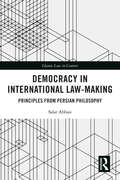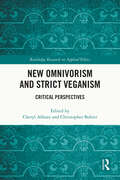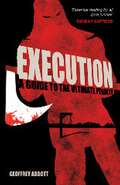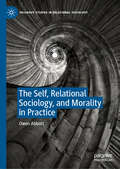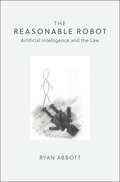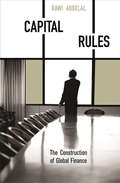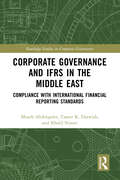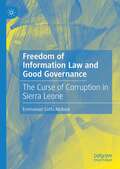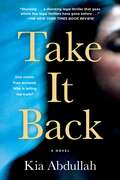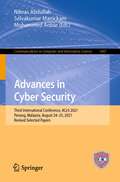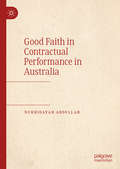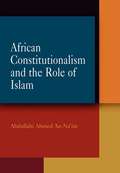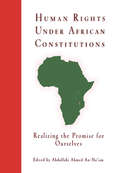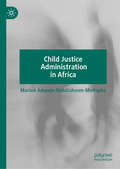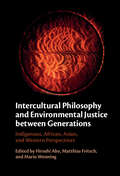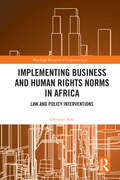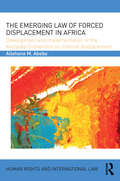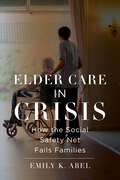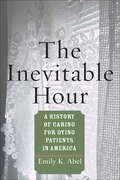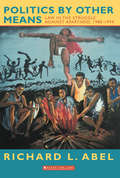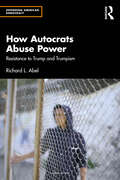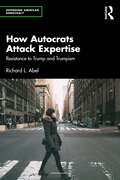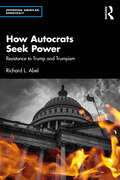- Table View
- List View
Democracy in International Law-Making: Principles from Persian Philosophy (Islamic Law in Context)
by Salar AbbasiThis book provides a critique of current international law-making and draws on a set of principles from Persian philosophers to present an alternative to influence the development of international law-making procedure. The work conceptualizes a substantive notion of democracy in order to regulate international law-making mechanisms under a set of principles developed between the twelfth and seventeenth centuries in Persia. What the author here names ‘democratic egalitarian multilateralism’ is founded on: the idea of ‘egalitarian law’ by Suhrawardi, the account of ‘substantial motion’ by Mulla Sadra, and the ideal of ‘intercultural dialectical democracy’ developed by Rūmī. Following a discussion of the conceptual flaws of the chartered and customary sources of international law, it is argued that ‘democratic egalitarian multilateralism’ could be a source for a set of principles to regulate the procedures through which international treaties are made as well as a criterion for customary international law-ascertainment. Presenting an alternative, drawn from a less dominant culture, to the established ideas of international law-making the book will be essential reading for researchers and academics working in public international law, history of law, legal theory, comparative legal theory, Islamic law, and history.
New Omnivorism and Strict Veganism: Critical Perspectives (Routledge Research in Applied Ethics)
by Cheryl Abbate Christopher BobierA growing number of animal ethicists defend new omnivorism—the view that it’s permissible, if not obligatory, to consume certain kinds of animal flesh and products. This book puts defenders of new omnivorism and advocates of strict veganism into conversation with one another to further debate in food ethics in novel and meaningful ways. The book includes six chapters that defend distinct versions of new omnivorism and six critical responses from scholars who are sympathetic to strict veganism. The contributors debate whether it’s ethically permissible to eat the following: "freegan" meat; roadkill; cultured meat; genetically disenhanced animals; possibly insentient animals, such as insects; and fish. The volume concludes with two chapters that examine strict vegan and new omnivore policies. Presenting readers with clear defenses and criticisms of the various dietary proposals, this book draws attention to the most important ethical challenges facing traditional animal agriculture and alternative systems of food production. New Omnivorism and Strict Veganism will appeal to scholars and students interested in food ethics, animal ethics, and agricultural ethics.
Execution: A guide to the Ultimate Penalty
by Geoffrey AbbottExecution is a fascinating account of methods of execution through the ages, such as death by cannibalism, being sewn into an animal’s belly and a thousand cuts. From the preparation of the victim to the disposal of the body, Execution answers all the questions you are ever likely to ask, and some you would never want to imagine.
The Self, Relational Sociology, and Morality in Practice (Palgrave Studies in Relational Sociology)
by Owen AbbottProviding a theory of moral practice for a contemporary sociological audience, Owen Abbott shows that morality is a relational practice achieved by people in their everyday lives. He moves beyond old dualisms—society versus the individual, social structure versus agency, body versus mind—to offer a sociologically rigorous and coherent theory of the relational constitution of the self and moral practice, which is both shared and yet enacted from an individualized perspective. In so doing, The Self, Relational Sociology, and Morality in Practice not only offers an urgently needed account of moral practice and its integral role in the emergence of the self, but also examines morality itself within and through social relations and practices. Abbott’s conclusions will be of interest to social scientists and philosophers of morality, those working with pragmatic and interactionist approaches, and those involved with relational sociology and social theory.
The Reasonable Robot: Artificial Intelligence and the Law
by Ryan AbbottToday, artificial intelligence (AI) and people do not compete on a level playing field. From a safety perspective, AI may be the best choice for driving a vehicle, but laws often prohibit driverless vehicles. At the same time, a person may be better at packing boxes at a warehouse, but a business may automate because AI receives preferential tax treatment. Or, AI may be better at helping businesses to innovate, but these same businesses may not want to use AI if doing so restricts future intellectual property rights. In The Reasonable Robot, Ryan Abbott argues that the law should not discriminate between people and AI when they are performing the same tasks, a legal standard that will help to eliminate market distortions and to ensure that decisions are made on the basis of efficiency. This work should be read by anyone interested in the rapidly evolving relationship between AI and the law.
Capital Rules: The Construction of Global Finance
by Rawi Abdelal"The rise of global financial markets in the last decades of the twentieth century was premised on one fundamental idea: that capital ought to flow across country borders with minimal restriction and regulation. Freedom for capital movements became the new orthodoxy. In an intellectual, legal, and political history of financial globalization, Rawi Abdelal shows that this was not always the case. Transactions routinely executed by bankers, managers, and investors during the 1990s—trading foreign stocks and bonds, borrowing in foreign currencies—had been illegal in many countries only decades, and sometimes just a year or two, earlier. How and why did the world shift from an orthodoxy of free capital movements in 1914 to an orthodoxy of capital controls in 1944 and then back again by 1994? How have such standards of appropriate behavior been codified and transmitted internationally? Contrary to conventional accounts, Abdelal argues that neither the U.S. Treasury nor Wall Street bankers have preferred or promoted multilateral, liberal rules for global finance. Instead, European policy makers conceived and promoted the liberal rules that compose the international financial architecture. Whereas U.S. policy makers have tended to embrace unilateral, ad hoc globalization, French and European policy makers have promoted a rule-based, “managed” globalization. This contest over the character of globalization continues today."
Capital Rules: The Construction of Global Finance
by Rawi Abdelal"The rise of global financial markets in the last decades of the twentieth century was premised on one fundamental idea: that capital ought to flow across country borders with minimal restriction and regulation. Freedom for capital movements became the new orthodoxy. In an intellectual, legal, and political history of financial globalization, Rawi Abdelal shows that this was not always the case. Transactions routinely executed by bankers, managers, and investors during the 1990s—trading foreign stocks and bonds, borrowing in foreign currencies—had been illegal in many countries only decades, and sometimes just a year or two, earlier. How and why did the world shift from an orthodoxy of free capital movements in 1914 to an orthodoxy of capital controls in 1944 and then back again by 1994? How have such standards of appropriate behavior been codified and transmitted internationally? Contrary to conventional accounts, Abdelal argues that neither the U.S. Treasury nor Wall Street bankers have preferred or promoted multilateral, liberal rules for global finance. Instead, European policy makers conceived and promoted the liberal rules that compose the international financial architecture. Whereas U.S. policy makers have tended to embrace unilateral, ad hoc globalization, French and European policy makers have promoted a rule-based, “managed” globalization. This contest over the character of globalization continues today."
Corporate Governance and IFRS in the Middle East: Compliance with International Financial Reporting Standards (Routledge Studies in Corporate Governance)
by Muath Abdelqader Tamer K. Darwish Khalil NimerThe rapid globalization of capital markets has increased attention toward examining the quality of the disclosure practices implemented by companies, as internationalization and globalization are the most important motives of the harmonization of financial statements preparation and presentation. Given the expansion of trade and the openness to foreign capital markets, investment decisions became not limited only for local users, but also international users may need to access the financial information. The issuance of International Financial Reporting Standards (IFRS) to be used throughout the world aims to improve the comparability and understandability of financial statements, and hence, to enhance investment decisions through helping investors across the borders to invest in multinational companies. Although fluid and under-developed institutional arrangements remain central features of emerging markets, ensuring effective corporate governance mechanisms would indeed support companies in complying with IFRS – the latter imposes a challenge for companies operating in emerging markets. This book evaluates the differences in the level of compliance with IFRS across the GCC states, exploring the impact of corporate governance on the level of compliance with IFRS and presenting an empirical analysis of companies across the GCC. It makes an important contribution by providing a detailed empirical analysis of the interplay between corporate governance and IFRS in emerging market setting and highlights the way for future research. It will provide international business, management, and accounting and finance students and senior practitioners with a completely new and updated guide to the work in the field of corporate governance and IFRS compliance in emerging markets.
Freedom of Information Law and Good Governance: The Curse of Corruption in Sierra Leone
by Emmanuel Saffa AbdulaiThis book argues that Sierra Leone’s ten-year civil conflict demonstrates the criticality of freedom of information (FOI) as a facet of good governance where corruption thrives, spanning both public and private sectors, if Sierra Leone’s continued security and stability are to be ensured. It argues that it was the absence of an anti-corruption tool like FOI and its attendants, transparency, and accountability, in governance generally, and in the area of the extractive industry in particular, that lead to other social phenomena which directly sparked the war. It proffers that for the continued consolidation of peace, security, stability and development in Sierra Leone, transparency and accountability must be ensured by protecting and implementing the demand driven anti-graft FOI.Straddling the disciplines of law, political science, public policy, and history, the book’s major premise is that it was the absence of FOI in the area of governance and the extractive industry, which enabled politicians, civil servants and the politically connected to ransom and exploit Sierra Leone’s mineral resources for their own profit with impunity, a state of affairs which led to underdevelopment, state collapse and an embittered civil populace especially the youth. The book postulates that as such any attempt to ensure long-term peace in Sierra Leone, should seek to avoid replicating the conditions that gave rise to that gruesome conflict- elites expropriation of national resources through endemic graft. The book proposes the comprehensive and effective implementation of the Right to Information Act 2013.
Take It Back: A Novel
by Kia AbdullahFrom author Kia Abdullah, Take It Back is a harrowing and twisting courtroom thriller that keeps you guessing until the last page is turned.One victim. Four accused. Who is telling the truth?Zara Kaleel, one of London's brightest legal minds, shattered the expectations placed on her by her family and forged a brilliant legal career. But her decisions came at a high cost, and now, battling her own demons, she has exchanged her high profile career for a job at a sexual assault center, helping victims who need her the most. Victims like Jodie Wolfe.When Jodie, a sixteen-year-old girl with facial deformities, accuses four boys in her class of an unthinkable crime, the community is torn apart. After all, these four teenage defendants are from hard-working immigrant families and they all have proven alibis. Even Jodie's best friend doesn't believe her.But Zara does—and she is determined to fight for Jodie—to find the truth in the face of public outcry. And as issues of sex, race and social justice collide, the most explosive criminal trial of the year builds to a shocking conclusion.
Advances in Cyber Security: Third International Conference, ACeS 2021, Penang, Malaysia, August 24–25, 2021, Revised Selected Papers (Communications in Computer and Information Science #1487)
by Nibras Abdullah Selvakumar Manickam Mohammed AnbarThis book presents refereed proceedings of the Third International Conference on Advances in Cyber Security, ACeS 2021, held in Penang, Malaysia, in August 2021. The 36 full papers were carefully reviewed and selected from 92 submissions. The papers are organized in the following topical sections: Internet of Things, Industry 4.0 and Blockchain, and Cryptology; Digital Forensics and Surveillance, Botnet and Malware, DDoS, and Intrusion Detection/Prevention; Ambient Cloud and Edge Computing, SDN, Wireless and Cellular Communication; Governance, Social Media, Mobile and Web, Data Privacy, Data Policy and Fake News.
Good Faith in Contractual Performance in Australia
by Nurhidayah AbdullahThis book gives a detailed account of the current state of the law concerning good faith in contractual performance in Australia, through an empirical study on its reception and development across the various Australian jurisdictions.In Australia, good faith received wide attention after Priestly J introduced in his obiter comments in Renard Construction (ME) v Minister for Works (1992) 26 NSWLR 234.This book focuses on the attitude of the judges to good faith, the definition of good faith, and the possibility of legislating a good faith obligation in Australian contract law. This book also discusses the issues surrounding its development, its meaning, and acceptance at the international level.The empirical legal research adopted in this book will offer a significant contribution in understanding the concept of good faith in Australia from the empirical perspective.
African Constitutionalism and the Role of Islam
by Abdullahi Ahmed An-Na'imConstitutionalism is steadily becoming the prevalent form of governance in Africa. But how does constitutionalism deal with the lingering effects of colonialism? And how does constitutional law deal with Islamic principles in the region? African Constitutionalism and the Role of Islam seeks to answer these questions. Constitutional governance has not been, nor will be, easily achieved, Abdullahi Ahmed An-Na'im argues. But setbacks and difficulties are to be expected in the process of adaptation and indigenization of an essentially alien concept--that of of nation-state--and its role in large-scale political and social organization.An-Na'im discusses the problems of implementing constitutionalized forms of government specific to Africa, from definitional to conceptual and practical issues. The role of Islam in these endeavors is open to challenge and reformulation, and should not be taken for granted or assumed to be necessarily negative or positive, An-Na'im asserts, and he emphasizes the role of the agency of Muslims in the process of adapting constitutionalism to the values and practices of their own societies. By examining the incremental successes that some African nations have already achieved and An-Na'im reveals the contingent role that Islam has to play in this process. Ultimately, these issues will determine the long-term sustainability of constitutionalism in Africa.
Human Rights Under African Constitutions
by Abdullahi Ahmed An-Na'imSome of the most massive and persistent violations of human rights occur in African nations. In Human Rights Under African Constitutions: Realizing the Promise for Ourselves, scholars from a wide range of fields present a sober, systematic assessment of the prospects for legal protection of human rights in Africa. In a series of detailed and highly contextual studies of Ethiopia, Ghana, Guinea, Morocco, Mozambique, Nigeria, Rwanda, Senegal, South Africa, Sudan, and Uganda, experts seek to balance the socioeconomic and political diversity of these nations while using the same theoretical framework of legal analysis for each case study.Standards for human rights protection can be realized only through direct and strong support from a nation's legal and political institutions. The contributors to this volume uniformly conclude that a well-informed and motivated citizenry is the most powerful force for creating the political will necessary to effect change at the national level. In addition to a critical evaluation of the current state of human rights protection in each of these African nations, the contributors outline existing national resources available for protecting human rights and provide recommendations for more effective and practical use of these resources.
Child Justice Administration in Africa
by Mariam Adepeju Abdulraheem-MustaphaThis interdisciplinary book analyzes the nature of child justice administration in Africa, particularly focusing on Nigeria and South Africa. The author uses a comparative approach in analyzing the legal regime and practice of child justice administration in Africa by recommending South Africa as inspiration for Nigeria since the justice sector in South Africa is significantly more developed. It further investigates various problems and challenges associated with children in the criminal justice system in Africa, thereby contributing to the cross-fertilization and collaboration among African nations that contributes to the development of the continent as a whole. The monograph shows that children are not only neglected by academics and practitioners but also that there is no access to scholarly materials in this area of law in Africa. This work contributes to knowledge in the area of law and methodology on the issue of child justice administration, development studies, political science, and African studies.
Intercultural Philosophy and Environmental Justice between Generations: Indigenous, African, Asian, and Western Perspectives
by Hiroshi Abe Matthias Fritsch Mario WenningThis anthology combines an intercultural approach with intergenerational ethics to address critical environmental challenges. Written by scholars from all over the world, including Canada, the US, New Zealand, Nigeria, Ethiopia, Japan, the UK, China, and Spain, this book offers new perspectives on how to foster sustainable societal practises that draw on the past and are fair to future generations. It introduces the Māori idea that views all things and human generations in layered relations; Indigenous accounts of spiralling time and reciprocities among ancestors and descendants; the philosophical dimensions of Chinese conceptions of ancestor spirits and future ghosts; and African accounts of anamnestic solidarity among generations. These ideas influence proposals for how to confront ending worlds and address the environmental future of humanity, making this book a valuable resource for scholars and students of environmental law and policy, environmental humanities, political science, and intercultural and comparative philosophy, as well as policymakers.
Implementing Business and Human Rights Norms in Africa: Law And Policy Interventions (Routledge Research in Corporate Law)
by Oyeniyi AbeThis book examines the contemporary and contentious question of the critical connections between business and human rights, and the implementation of socially responsible norms in developing countries, with particular reference to Kenya, Nigeria, South Africa. Business enterprises and transnational corporate actors operate in a complex global environment, especially when operating in high risks sectors such as oil and gas, mining, construction, banking, and health care amongst others. Understanding human rights responsibilities, impacts and socially responsible behaviour for companies is therefore an essential component of corporate risk management in our current world. The release of the United Nations Guiding Principles on Business and Human Rights, an instrument consisting of 31 principles on this issue, has further underscored the emergence of a rapidly developing set of international law norms on human rights responsibilities of businesses and transnational corporations. It has also shaped the discourse on corporate accountability for human rights. In addition to minimizing litigation, financial and reputational risks, understanding and demonstrating corporate respect for human rights is vital to building a culture of trust and integrity amongst local communities, investors, and shareholders. While Africa has been at the receiving end of deleterious activities of corporate actors, it has failed to address corporate impunity and human rights violations by non-state actors. Questions abound revolving around the underpinnings of a corporate responsibility to respect human rights, that is, how non-western and particularly African conceptions of respect may help develop a ‘beyond do no harm’ approach to respect; policy discourses on human rights due diligence, human rights impact assessment; mandating corporate respect for human rights in both domestic and international law. This book examines, clarifies, and unpacks the guiding principles of a rights-based approach to development and social inclusion. It offers an excellent exposition of regulatory capacity, institutional efficacy and democratic legitimacy of governance institutions that shape development including a comprehensive analysis of how states are shaping business and human rights discourses locally to develop a critical understanding of identified issues by exploring the latest theories through comparative lenses
Syrian Chemical Weapons and International Law
by Tatsuya AbeThis is the first book to focus on international efforts to address Syrian chemical weapons issues in an international law context. It provides an overview of the process of control over Syrian compliance/non-compliance with international obligations, including the keys to success in eliminating Syria’s stockpiles and reasons for difficulties in handling multiple uses of toxic chemicals as weapons in domestic armed conflicts. It also addresses collective and unilateral sanctions against Syria outside of international institutional frameworks, and their implications for subsequent cases. Supported by extensive analyses of developments within the OPCW Executive Council and the UN Security Council, this book is recommended for readers seeking insight about chemical weapons issues and dynamism of international law.
The Emerging Law of Forced Displacement in Africa: Development and implementation of the Kampala Convention on internal displacement (Human Rights and International Law)
by Allehone M. AbebeAs of the end of 2015, there were 40.8 civilians who had been internally displaced by conflicts and effects of natural disasters in various parts of the world. Internally displaced persons (IDPs) are currently the largest group of persons receiving assistance from some of the main international humanitarian organisations. With the largest concentration of internally displaced persons (IDPs), the African continent has been the worst affected region. While previously IDPs have largely been neglected under international law, the first-ever continental binding treaty on internal displacement, the African Union Convention on the Protection of and Assistance to Internally Displaced Persons (the Kampala Convention), entered into force on 6 December 2012. As of January 2016, 25 states have ratified the instrument while 40 states have become signatories. This book significantly contributes to the study, policy making and practice on managing internal displacement by presenting the first major systematic examination of the evolution, elements and implementation of the Kampala Convention. It explores the responsibility of the state for the protection of IDPs particularly those who are most vulnerable during armed conflicts, internal strife, natural disasters, human rights violations and other circumstances. The status of ratification of the Convention is reviewed as well as the steps currently being undertaken by governments to implement the Convention. It also analyses the contribution by human rights mechanisms, inter-governmental bodies and UN peace-keeping missions in the implementation of the Convention. The book casts the Kampala Convention in broader institutional and normative developments in Africa and beyond. It demonstrates how concepts such as ‘responsibility to protect’ and ‘sovereignty as responsibility’ have begun to make inroads; influencing some of the more progressive instruments adopted by the African Union. It also sheds light on the relationship between the Convention and some regional instruments. In assessing the effectiveness of the Kampala Convention Allehone Abebe argues that the link between the Convention and initiatives on development, human rights and governance in Africa should be fully fostered.
Elder Care in Crisis: How the Social Safety Net Fails Families (Health, Society, and Inequality #2)
by Emily K. AbelExplains why there is a crisis in caring for elderly people and how the COVID-19 pandemic exacerbated itBecause government policies are based on an ethic of family responsibility, repeated calls to support family members caring for the burgeoning elderly population have gone unanswered. Without publicly funded long-term care services, many family caregivers cannot find relief from obligations that threaten to overwhelm them. The crisis also stems from the plight of direct care workers (nursing home assistants and home health aides), most of whom are women from racially marginalized groups who receive little respect, remuneration, or job security. Drawing on an online support group for people caring for spouses and partners with dementia, Elder Care in Crisis examines the availability and quality of respite care (which provides temporary relief from the burdens of care), the long, tortuous process through which family members decide whether to move spouses and partners to institutions, and the likelihood that caregivers will engage in political action to demand greater public support. When the pandemic began, caregivers watched in horror as nursing homes turned into deathtraps and then locked their doors to visitors. Terrified by the possibility of loved ones in nursing homes contracting the disease or suffering from loneliness, some caregivers brought them home. Others endured the pain of leaving relatives with severe cognitive impairments at the hospital door and the difficulties of sheltering in place with people with dementia who could not understand safety regulations or describe their symptoms. Direct care workers were compelled to accept unsafe conditions or leave the labor force. At the same time, however, the disaster provided an impetus for change and helped activists and scholars develop a vision of a future in which care is central to social life.Elder Care in Crisis exposes the harrowing state of growing old in America, offering concrete solutions and illustrating why they are necessary.
The Inevitable Hour: A History of Caring for Dying Patients in America
by Emily K. AbelChanges in health care have dramatically altered the experience of dying in America.At the turn of the twentieth century, medicine’s imperative to cure disease increasingly took priority over the demand to relieve pain and suffering at the end of life. Filled with heartbreaking stories, The Inevitable Hour demonstrates that professional attention and resources gradually were diverted from dying patients. Emily K. Abel challenges three myths about health care and dying in America. First, that medicine has always sought authority over death and dying; second, that medicine superseded the role of families and spirituality at the end of life; and finally, that only with the advent of the high-tech hospital did an institutional death become dehumanized. Abel shows that hospitals resisted accepting dying patients and often worked hard to move them elsewhere. Poor, terminally ill patients, for example, were shipped from Bellevue Hospital in open boats across the East River to Blackwell’s Island, where they died in hovels, mostly without medical care. Some terminal patients were not forced to leave, yet long before the advent of feeding tubes and respirators, dying in a hospital was a profoundly dehumanizing experience.With technological advances, passage of the Social Security Act, and enactment of Medicare and Medicaid, almshouses slowly disappeared and conditions for dying patients improved—though, as Abel argues, the prejudices and approaches of the past are still with us. The problems that plagued nineteenth-century almshouses can be found in many nursing homes today, where residents often receive substandard treatment. A frank portrayal of the medical care of dying people past and present, The Inevitable Hour helps to explain why a movement to restore dignity to the dying arose in the early 1970s and why its goals have been so difficult to achieve.
Politics By Other Means: Law in the Struggle Against Apartheid, 1980-1994
by Richard AbelPolitics by Other Means explores the fundamental question of how law can constrain political power by offering a pathbreaking account of the triumphant final decade of the struggle against apartheid. Richard Abel presents case studies of ten major legal campaigns including: challenges to pass laws; black trade union demands for recognition; state terror; censorship; resistance to the "independent" homelands; and treason trials.
How Autocrats Abuse Power: Resistance to Trump and Trumpism (Defending American Democracy)
by Richard L. AbelChronicling and analyzing resistance to the threat that autocracy poses to American liberal democracy, this book provides the definitive account of both Trump’s efforts to erode democracy’s essential elements and opposition to those efforts. This book is about the threat of autocracy, which antedated Donald Trump and will persist after he leaves the stage. Autocrats blur or breach the separation of powers, use executive orders to bypass the legislature, pack the courts, replace career prosecutors with political appointees, abuse the pardon power, and claim immunity from the law. They seek to hobble opposition from civil society by curtailing speech and assembly, tolerating and even encouraging vigilante violence, and attacking the media. As this book demonstrates, Trump followed the autocrat’s playbook in many ways. He was a huckster of hate, aiming his vitriol at women and racial minorities and making attacks on immigrants the focus of his 2016 campaign, as well as his first years in office. Nevertheless, his rhetoric and policies encountered widespread opposition—from religious leaders, business executives, lawyers and bar associations, and civil servants. His executive orders (on which he relied) were almost all struck down by courts: including the first two “Muslim bans,” the detention of children and their separation from parents, the diversion of military funds to build the border wall, the insertion of a citizenship question in the census, and the limits on asylum. Just as Trump sought to weaponize the criminal justice system against his political opponents, so he manipulated it to defend his cronies, derailing some of their prosecutions. Trump also intervened in courts martial and criminal prosecutions of those convicted of war crimes in Afghanistan and Iraq and those accused of desertion and terrorism. Again, however, there was resistance, as some career prosecutors withdrew from cases or resigned when subjected to political pressure and federal courts convicted all of Trump’s allies—even though the president went on to use his unreviewable pardon power. This book, then, documents the abuses that are characteristic of autocracy and assesses the various forms of resistance to them. This definitive account and analysis of Trumpism in action, as well as the resistance to it, will appeal to scholars, students, and others with interests in politics, populism, and the rule of law and, more specifically, to those concerned with resisting the threat that autocracy poses to liberal democracy.
How Autocrats Attack Expertise: Resistance to Trump and Trumpism (Defending American Democracy)
by Richard L. AbelChronicling and analyzing resistance to the threat that autocracy poses to American liberal democracy, this book provides the definitive account of Trump’s assault on truth and his populist attacks on expertise, as well as scientific and legal opposition to them. This book is about the threat of autocracy, which antedated Donald Trump and will persist after he leaves the stage. Pandering to populists, autocrats attack professional expertise in an Orwellian world, where “ignorance is strength” and where, as Hannah Arendt wrote, people “believe everything and nothing.” Trump sought to inflame xenophobia by blaming China for the pandemic and closing U.S. borders, then declaring victory and, when that proved premature, wrongly blaming the number of tests for escalating cases. He sought to muzzle government scientists and denounced those who defied or evaded his directives as members of the “deep state,” preferring to rely on inexpert buddies. He elevated obscure scientists who promoted quack cures and opposed effective preventive measures while sidelining the few reputable experts, who nevertheless courageously resisted political interference. In addition to these, as this book documents, independent scientists, scientific journals and professional associations also outspoken, often more so. Even the pharmaceutical industry sought to preserve the integrity of a federal bureaucracy that assured the public the drugs they consumed were safe and efficacious. Following Trump’s numerous efforts to distort and undermine expertise, this book describes and evaluates the resilience of scientific and legal defenses of truth. This definitive account and analysis of the Trump’s populist rejection of truth and expertise will appeal to scholars, students and others with interests in politics, populism and the rule of law and, more specifically, to those concerned with resisting the threat that autocracy poses to liberal democracy.
How Autocrats Seek Power: Resistance to Trump and Trumpism (Defending American Democracy)
by Richard L. AbelChronicling and analyzing resistance to the threat that autocracy poses to American liberal democracy, this book provides the definitive account of the rise of Trump’s populist support in 2016, and his failed efforts to nullify the result of the 2020 election.This book is about the threat of autocracy, which antedated Donald Trump and will persist after he leaves the stage. Autocracy negates both liberalism—which includes the protection of fundamental rights, the rule of law, separation of powers, and respect for specialist expertise—and democracy—which requires that the state be responsible to an electorate composed of all eligible voters—by concentrating unconstrained power in a single individual. Anticipating defeat in the 2016 election, Trump attacked suggestions that he had sought, or even benefited from, Russian assistance despite the evidence, and he made repeated claims of election fraud. In 2020, fearful that his mishandling of the pandemic had alienated voters, he intensified the allegations of fraud, demanding recounts, pressuring state legislatures and state election officials, advancing bizarre conspiracy theories, and finally, calling for a massive demonstration, urging protesters to march to the Capitol to pressure Congress, promising to accompany them. But as this book documents, Trump’s efforts to nullify the result of the 2020 election failed. As the courts rejected his numerous challenges, state election officials loyally performed their statutory duties, the Justice Department found no evidence of fraud, and politicians from all sides certified Biden’s victory, this book traces the many, and varied, forms of the defense of liberal democracy located within both the state and civil society, including law (judges, government lawyers, and private practitioners), the media, NGOs, science (and other forms of expertise), and civil servants (in federal, state, and local government). Evaluating their efficacy, the book maintains, is vital if—as history has repeatedly taught us—the price of liberal democracy, like that of liberty itself, is eternal vigilance.This definitive account and analysis of Trumpism and the resistance to it will appeal to scholars, students, and others with interests in politics, populism, and the rule of law and, more specifically, to those concerned with resisting the threat that autocracy poses to liberal democracy.
